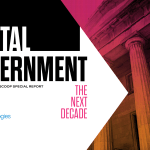What will the next decade of government technology look like?

Jonathan Reichental, who stepped down as the chief information officer of Palo Alto, California, in 2018, and who has since spent his time teaching about and literally writing the book on “smart cities” technology, is better equipped than most to predict what the future of government technology will look like.
He’s an advocate of government, but also critical of its shortcomings. His qualifications lie not only in his experience, but in his motivations. Why did he step down? For the same reason he started.
What is it that drew you into government technology?

Jonathan Reichental
I am definitely sort of an idealist. It’s a cliché, but I actually want to make things better. When I take a job, I usually stay a while. They’re often dysfunctional environments where things are broken and the value I bring is in sort of being the turnaround agent, the guy who helped make things positive. And I couldn’t think of a better world than government, that’s in desperate need of turnaround and sadly entrenched in an early 20th century mode in a 21st century world.
And you’ve heard this statistic a billion times — we’re moving into cities 3 million of us every week and will continue like that for decades. The future belongs to cities. If I can be an educator, I feel like I’m making a difference. I’m making an impact on lots and lots of people. And I really mean it, you know, I’m not being hokey about it. I really mean it.
Ok, so what technologies will we see in the next 10 years that will make things better?
One of the largest areas I would argue for is the emergence of what I would call “everything as a service” or “X as a service.” And it’s a category of technologies that includes software as a service, platform as a service, infrastructure as a service, even AI as a service and health care as a service. It’s basically delivering computing capability and function over an internet connection.
Governments have been slow to this, they’ve been generally slow in embracing cloud computing and finally we’ve turned the corner on that. This whole legacy of data centers and infrastructure and hardware, it’s all going to start to evaporate.
What else?
We’re going to see the wide adoption of self-driving vehicles and autonomous drones. That’s not a question of if, it’s a question of when. And you think about ground-based drones, aerial drones, all sorts of delivery vehicles, public transport, all autonomous — that changes the game in the city environment. And the result is a lot of supporting technologies for that and the different skills that are needed to support that new autonomous future.
Another area is fully embracing digitalization, which is already happening in places around the world. In Dubai, they’ve committed to a completely paperless government by 2022 and even the U.S. federal government’s U.S. Digital Service has been tasked with improving the digital experience. But you walk into any city hall in America and what you see is filing cabinets and paperwork and you see inefficient systems and inefficient processes and all of that will be digitized and I think it will accelerate. It will accelerate because people expect it but also because it’s cheaper and easier.
And then finally is artificial intelligence. Government has been slow. It’s finally starting to make an impact in the private sector and there’s no question as I research and study — there’s AI in customer service, in energy, in building management — that we’ll start to see AI pervade every part of city operations.
I hear people talk about data a lot. How important will data be?
We will see greater utilization of data and data science in cities. We see it today. We see data use, but I would consider it to be relatively immature, so that is going to be an area of significant growth, data utilization, data-driven decision making, data science in general and data governance. So cities need to get on board with the value they have in the existing data.
Something I see missing a lot in governments is really good governance, which is ironic given that it’s government. But here I’m talking about things like strategy governance, data governance, emerging technology governance, having in place processes that are agreed and provide standards for leveraging the value of these things. Here’s a little test. Go into any government anywhere in America and find a data set and ask who owns the data set and I can almost guarantee you 99 out of 100 times you’ll get a blank look. The most basic quality of data, which is an owner, doesn’t exist in most governments. And that’s a real strong weakness. That’s why we don’t get the value out of the data that we have because nobody’s waking up every day and living and breathing it.
How do you think of cities compared to states? Are cities incubators, do they run in parallel, or is it apples and oranges?
The action is at the city level, no doubt. In every country in the world, when I look at states, counties, provinces, federal, they all do important things, but the action, the real action, happens at the city level.
What happens when you get to the county and then the state and federal is it gets more and more abstracted. The connection between the individual and the service widens. If you’re in a city and you’re pissed off or something, you can go see the person who made it that day or the next day. You’ve got a very close proximity to the service.
But if I can’t stand the DMV, it’s completely a black box to me. It’s a state-driven service that I don’t how to navigate and it seems too big and complex for communities to really engage with. I think states are doing a poor job in telling their story. Could I tell you what the CIO for the State of California is doing right now? No. And I’m somebody who is very, very active in the government world.
Well, many states are certainly trying at that, but to what extent they’re succeeding is another question.
I can tell you a little story about that. When I first joined the City of Palo Alto, one of my first missions was to go and visit the state CIO. And myself and four managers we drove up to Sacramento and we met with him and he brought some of his leaders and my opening comment I said, “I’m so glad you made some time for us this morning. You must be inundated with visits from cities around all over California.” And he said, “Nope, you’re the first city CIO in California ever to visit.” And he’d been there about 10 years. I thought, that’s weird. So long story short, zero interaction between cities and states. That was ten years ago and even when he left and the new CIO came in, there was no attempt at outreach or anything. There’s no relationship between cities and states in terms of IT. It’s very bad.
Ok, we’ll solve that problem another day. What technologies that are emerging now do you think are not going to pan out?
Maybe this is a poor answer, but I’m very much in the blockchain community, but when a new technology emerges, people generally focus on the tech and it takes them a while to focus on the solution. Like how everybody gets excited about AI. But that’s meaningless. What’s the impact? What does that mean to a person who lives in a city?
But we often don’t start there. We start with the tech and then you get the whole tech debate about whether something’s stable or not stable or scalable, does it adopt standards? Technology people get super focused on the technology. And so blockchain is sort of over the hype cycle now and definitely in the trough of disillusionment, but I don’t think it’s going away. I think this obsession we have with blockchain changing the world will disappear and it will become an important but more invisible technology.
I think the cynicism about blockchain — and that is one of the technologies I was thinking about when I asked that question — has to do with the kind of subculture that sprouted up around it. That’s what people are reacting to more so than the actual technology itself.
Yeah, that’s so huge. I’ve been in tech for over 30 years and you see it all the time. You get a new tech, which is groundbreaking and then immediately, I like your term, it generates a subculture. And the subculture almost dominates for the first few years before it becomes mainstream.
I think it’s also like what you said about AI. It’s the images in popular culture and movies and stuff and then when you actually start seeing AI, so far it’s more like chatbots and things that are a lot less exciting than WALL-E or whatever other robot you like.
There’s no question that science fiction does drive how we think about technology and what the future will be. It’s the reason why when the Space Shuttle first rolled out they called the first one Enterprise. It’s from Star Trek, right? Because people have this idea. When we think of robots, we think of C3PO. And AI is one of those things. Everybody wants Amazon’s Alexa to be Hal from 2001: A Space Odyssey that has feelings and emotions and follows up on things…
I don’t think anyone wants it to be Hal. That didn’t turn out well.
That didn’t turn out well, but you know what I mean, Siri or Alexa is: ‘What’s the weather like outside’ and does a lookup. Or you say you want to buy some toilet paper and it does a lookup. It hasn’t met our expectations yet. It’s not the thinking, feeling computer, but the idea that the hype around AI is going to disappear in the next few years, I wouldn’t agree with that. I think AI is going to be transformative and especially as we go from artificial intelligence to what’s called artificial general intelligence. Then it’s starting to become really interesting, and our challenges in cities and also in the private sector is going to be how we control that, how we regulate it, because, boy, in a 10-year time horizon, AI’s going to give us a lot of headaches, a lot of challenges.
Right. Well, Nick Bostrom’s work both has me worried about AGI and convinced it’s another problem we’re not going to solve right now. So, one of the things you mentioned reminded me of what you hear state CIOs talking a lot about these days: the elimination of the traditional IT model and CIOs becoming more “brokers” of services. What do you think the knock-on effects of that are going to be for government?
I’m generally in agreement. I do think the CIO role has overall been trending toward more of a broker role and I think definitely at the state level. At the city level, the CIO is still very much a hands-on person who needs to make things happen. So different levels of abstraction require different levels of control and I think state CIOs have to be brokers and relationship managers and they need to be great communicators and I would argue they’re not today. They need to be better at telling the story and getting into communities, which I don’t see.
CIOs also need to ramp up their interest and their expertise around innovation. There isn’t going to be much need as time goes on for really understanding the deep, technical back-end. It’s just going to be so much more simplified as time goes by. What really matters is how we deliver better services to our community. How can we manage traffic and energy and health care and poverty and homelessness, how can we apply technology? And that requires an innovative mindset and I don’t see enough of that. That’s got to grow for the state CIO and the government CIO in general has to be much more of an innovator and have an innovation mindset.
Jonathan Reichental is the former chief information officer of Palo Alto, California, and the author of Smart Cities For Dummies.
This story is part of Digital Government: The Next Decade: A StateScoop & EdScoop Special Report.

This story was featured in StateScoop Special Report: Digital Government: The Next Decade (2020)






